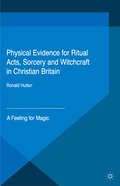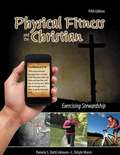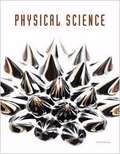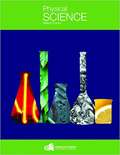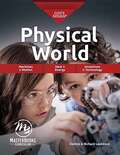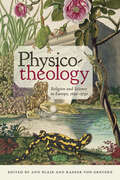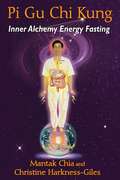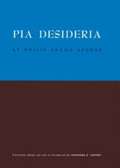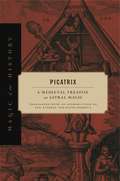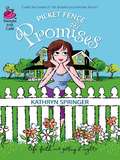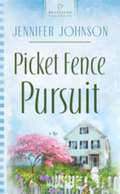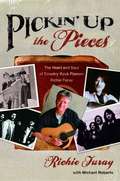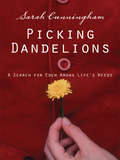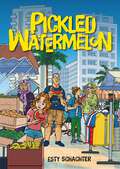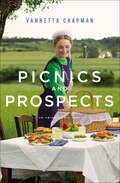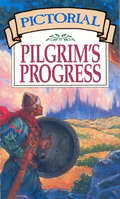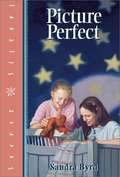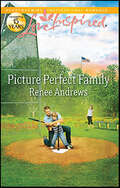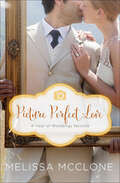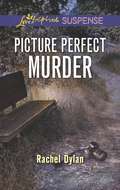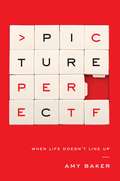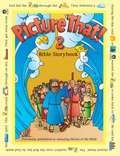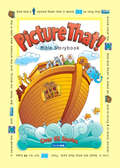- Table View
- List View
Physical Evidence for Ritual Acts, Sorcery and Witchcraft in Christian Britain: A Feeling for Magic (Palgrave Historical Studies in Witchcraft and Magic)
by Ronald HuttonThis volume investigates the physical evidence for magic in medieval and modern Britain, including ritual mark, concealed objects, amulets, and magical equipment. The contributors are the current experts in each area of the subject, and show between them how ample the evidence is and how important it is for an understanding of history.
Physical Fitness and the Christian: Exercising Stewardship (Fifth Edition)
by Pamela Diehl Johnson L. Delyte MorrisThe book helps the reader to understand the details of a physical fitness program as a stewardship responsibility and appreciate the life-long personal responsibility involved in pursuing physical fitness.
Physical Science
by R. Terrance Egolf Donald CongdonBeginning with an introduction to why we do science, the Physical Science Student Text, 5th ed., gradually builds the student's understanding of physics concepts in a logical sequence. Beginning with classical mechanics, the text progresses through work and energy, wave phenomena, electricity and magnetism, and light and optics. These transition naturally into the chemistry topics, beginning with the atomic model, then to elements and compounds, chemical reactions, and finishing with solutions, and acids, basis, and salts. Every chapter shows by example why the subject matter is relevant to a Christian worldview of science.
Physical Science Second Edition
by Barbara Ferrier Timothy EimerScience textbook for middle school students
Physical World (student)
by Debbie Lawrence Richard LawrenceStudy introductory physics and the mechanisms of heat, machines, and technology with this accessible course. Machines & Motion: Learn about many fascinating inventions, such as the physical principles behind flight and the advances in communication as you study airplanes, rockets, telephones, computers, and more! Heat & Energy: Discover many kinds of energy that power our lives. From fossil fuels to nuclear power plants, see how God provides our energy needs and learn the wonders of electricity, magnetism, light, and sound. Inventions & Technology: Understand simple machines such as levers and inclined planes. Learn about the law of motion. You will enjoy experimenting with friction, racing rollerskate cars, and making pendulums.
Physico-theology: Religion and Science in Europe, 1650–1750 (Medicine, Science, and Religion in Historical Context)
by Ann Blair and Kaspar von GreyerzThis first book-length study of physico-theology questions the widespread notion of a steadily advancing early modern separation of religion and science.Beginning around 1650, the emergence of a number of new scientific concepts, methods, and instruments challenged existing syntheses of science and religion. Physico-theology, which embraced the values of personal, empirical observation, was an international movement of the early Enlightenment that focused on the new science to make arguments about divine creation and providence. By reconciling the new science with Christianity across many denominations, physico-theology played a crucial role in diffusing new scientific ideas, assumptions, and interest in the study of nature to a broad public. In this book, sixteen leading scholars contribute a rich array of essays on the terms and scope of the movement, its scientific and religious arguments, and its aesthetic sensibilities.Contributors: Ann Blair, Simona Boscani Leoni, John Hedley Brooke, Nicolas Brucker, Katherine Calloway, Kathleen Crowther, Brendan Dooley, Peter Harrison, Barbara Hunfeld, Eric Jorink, Scott Mandelbrote, Brian W. Ogilvie, Martine Pécharman, Jonathan Sheehan, Anne-Charlott Trepp, Rienk Vermij, Kaspar von Greyerz
Pi Gu Chi Kung: Inner Alchemy Energy Fasting
by Mantak Chia Christine Harkness-GilesA step-by-step guide to the Taoist fasting practice of Pi Gu • Explains how you do not stop eating with this fasting practice and details the simple pi gu diet • Illustrates the chewing and chi kung practices to accompany pi gu, for natural chi energy production • Reveals how Pi Gu Chi Kung activates the body’s natural healing abilities, accelerates the elimination of toxins, reduces appetite and cravings, and enables you to draw energies from the Earth and Universe Pi gu is an ancient Taoist method of fasting for spiritual and healing purposes. Unlike traditional fasting, you do not need to stop eating when practicing pi gu. Used by ancient Taoist masters during their months or years of solitary retreat in pursuit of enlightenment, the practice centers on a simple diet of fruits, teas, nuts, and eggs paired with special chewing techniques and chi kung exercises. During the pi gu state, the need for food decreases yet the body’s energy levels actually increase. The body gathers chi not from food but from chi kung and the “golden elixir” produced by the pi gu chewing practices. The chi produced through pi gu charges your internal organs, activating the body’s natural healing abilities and enabling you to draw energies from the Earth and Universe. In the pi gu state the body automatically balances itself, the mind is more relaxed, and sleep improves. The pause in normal eating makes the body’s cells more sensitive, accelerating the elimination of toxins. The stomach reduces in size, flattening the belly, eliminating cravings, decreasing appetite, and naturally producing weight loss. The body’s meridians stay open, making it easier to attune to meditation, chi kung, and energies from the cosmos. Providing a step-by-step guide to Pi Gu Chi Kung, Master Mantak Chia and coauthor Christine Harkness-Giles explain the pi gu diet, provide immortality tea recipes, detail the pi gu chewing exercises, and illustrate the corresponding chi kung energy exercises. They also explain the use of pi gu during darkness retreats to enhance spiritual awareness and increase mental powers and wisdom.
Pia Desideria
by Theodore G. Tappert Philip Jacob SpenerThis classic work, first published in 1675, inaugurated the movement in Germany called Pietism. In it a young pastor, born and raised during the devastating Thirty Years War, voiced a plea for reform of the church which made the author and his proposals famous. A lifelong friend of the philosopher Leibnitz, Spener was an important influence in the life of the next leader of German Pietism, August Herman Francke. He was also a sponsor at the baptism of Nicholas Zinzendorf, founder of the Moravian Church, whose members played a crucial role in the life of John Wesley.
Picatrix: A Medieval Treatise on Astral Magic (Magic in History)
by Dan Attrell David PorrecaA manual for constructing talismans, mixing magical compounds, summoning planetary spirits, and determining astrological conditions, Picatrix is a cornerstone of Western esotericism. It offers important insights not only into occult practices and beliefs but also into the transmission of magical ideas from antiquity to the present. Dan Attrell and David Porreca’s English translation opens the world of this vital medieval treatise to modern-day scholars and lay readers.The original text, Ghāyat al-Ḥakīm, was compiled in Arabic from over two hundred sources in the latter half of the tenth century. It was translated into Castilian Spanish in the mid-thirteenth century, and shortly thereafter into Latin. Based on David Pingree’s edition of the Latin text, this translation captures the spirit of Picatrix’s role in the European tradition. In the world of Picatrix, we see a seamless integration of practical magic, earnest piety, and traditional philosophy. The detailed introduction considers the text’s reception through multiple iterations and includes an enlightening statistical breakdown of the rituals described in the book.Framed by extensive research on the ancient and medieval context that gave rise to the Latin version of the text, this translation of Picatrix will be an indispensable volume for students and scholars of the history of science, magic, and religion and will fascinate anyone interested in the occult.
Picatrix: A Medieval Treatise on Astral Magic (Magic in History)
by Dan Attrell David PorrecaA manual for constructing talismans, mixing magical compounds, summoning planetary spirits, and determining astrological conditions, Picatrix is a cornerstone of Western esotericism. It offers important insights not only into occult practices and beliefs but also into the transmission of magical ideas from antiquity to the present. Dan Attrell and David Porreca’s English translation opens the world of this vital medieval treatise to modern-day scholars and lay readers.The original text, Ghāyat al-Ḥakīm, was compiled in Arabic from over two hundred sources in the latter half of the tenth century. It was translated into Castilian Spanish in the mid-thirteenth century, and shortly thereafter into Latin. Based on David Pingree’s edition of the Latin text, this translation captures the spirit of Picatrix’s role in the European tradition. In the world of Picatrix, we see a seamless integration of practical magic, earnest piety, and traditional philosophy. The detailed introduction considers the text’s reception through multiple iterations and includes an enlightening statistical breakdown of the rituals described in the book.Framed by extensive research on the ancient and medieval context that gave rise to the Latin version of the text, this translation of Picatrix will be an indispensable volume for students and scholars of the history of science, magic, and religion and will fascinate anyone interested in the occult.
Picket Fence Promises
by Kathryn SpringerTwenty years and several pounds ago. . . I was Bernice Strum, hairstylist to the stars. Until I fell for--and got pregnant by--Alex Scott, a handsome actor with a career on the rise. But I gave my baby up for adoption and moved across the country to settle in Prichett, Wisconsin. I made friends, started a faith journey, and then one day I got a call from my now-adult daughter that turned my world upside down. . . and brought Alex back into my life. Now he's here (living in my dream house!) and he wants to pick up where we left off--but how can I trust his picket-fence promises when he's not a believer in anything but himself?
Picket Fence Pursuit
by Jennifer JohnsonAs a coal miner's daughter, Kylie knows all about life on the bottom rung. Now, with her accounting degree and the ideal job in sight, she will let nothing come between her and the goals she is sure God has given her. Especially not marrying some yahoo who doesn't even have a real job--no matter how cute he is! Ryan Watkins enjoyed unusual success early in life. But he's watched his money change those around him. Despite the powerful attraction he feels towards Kylie, he fears she, too, would only love him for his money. Can Kylie learn to let go of her plans and trust God for His perfect will? Will Ryan see beyond Kylie's need for security to the woman she truly is?
Pickin' Up the Pieces: The Heart and Soul of Country Rock Pioneer Richie Furay
by Michael Roberts Richie FurayWhen a young Richie Furay moved to New York hoping to make it big in folk music, God wasn't one of his concerns. But destiny was. Later, when he started Buffalo Springfield with Neil Young and Stephen Stills, it seemed Furay's destiny had finally arrived. Although the band recorded only three albums, it remains a touchstone of sixties rock music-with all five band members now enshrined in the Rock and Roll Hall of Fame. Furay remained a musical pioneer, forming Poco and recording some of the first-and best-country rock music of the sixties and seventies. His work was a major influence on the Eagles and innumerable other bands. But he still had not found his destiny. It wasn't until his marriage almost disintegrated that Furay confronted his need for God. After co-founding two legendary bands and recording with a rock super-group, Richie Furay finally found his destiny. The long journey took him from sold-out arena concerts to the pulpit of a Colorado church, from rock royalty to the Rock of Ages.Destiny is often found in the places where we're not looking. As you follow the twists and turns in Richie Furay's inspiring journey, you'll gain fresh insight into your own.From the Trade Paperback edition.
Picking Dandelions: A Search for Eden Among Life’s Weeds
by Sarah Raymond CunninghamSarah Cunningham, a moderate middle-class white girl who grew up in the Michigan countryside, speaks about God with humor and honesty more characteristic of liberal west-coast writers in this Picking Dandelions Ebook. In this warm and witty memoir, she describes finding and keeping a personal faith in the quirky settings of her ultra-Christian childhood. Whether recounting living next to a cemetery, teaching at-risk high schoolers, or listening to her grandmother’s stories about being a British “war bride,” the author weaves faith into down-to-earth metaphors of growth and renewal, planting and reaping, greenery and weeds. In the end, Cunningham succeeds in sifting through the dysfunctions and flaws of human life and discovering pockets of God’s original Eden goodness for both herself and for you. Picking Dandelions is a candid and personal account of outgrowing laissez-faire Christianity, moving into mature faith, and realizing that a God-following person is a changing person … and you just might follow suit.
Pickled Watermelon
by Esty SchachterIt's the summer of 1986, and eleven-year-old Molly just wants to spend the summer with her friends at camp. Instead, she reluctantly heads to Israel to visit family she barely knows! With a less-than-basic knowledge of Hebrew that she picked up in Hebrew school, Molly wonders how she will be able to communicate and have fun in a country that is new and foreign to her. Luckily, surprises are in store.
Picnics and Prospects: An Amish Picnic Story (Amish Picnic Stories)
by Vannetta ChapmanAn Amish Picnic story by Vannetta ChapmanFaith Troyer is claustrophobic, and David Lapp builds tiny houses. They went on a date years ago with disastrous results. Now that they&’re in their late twenties, their families and friends are beginning to wonder if either will ever find that special someone. When a picnic outing is diverted by the discovery of a package of letters dating back to the 1970s, they take it upon themselves to find answers to a mystery that causes them to rethink their past and consider their future.
Pictorial Pilgrim's Progress
by John BunyanChristian experiences are detailed for beginners with corresponding sketches on each page.
Pictorial Pilgrim's Progress
by John BunyanChristian experiences are detailed for beginners with corresponding sketches on each page.
Picture Perfect (Secret Sisters Book #11)
by Sandra ByrdEmbark on new adventures with best friends, Tess and Erin, in each exciting book of the Secret Sisters series for girls. Book 11 of 12 Book Series! Are Tess and Erin pretty enough? Secret Sisters Tess and Erin want to go to modeling school, and they hope to get paid modeling jobs when they're through. Will they get to go? And if they do, do they have what it takes to make it? Or is their idea of what it takes different from reality? While the girls discover the answers to these questions, something surprising happens that puts their view of beauty to the ultimate test. As they struggle to come to terms with this unexpected event, they find that God's definition of beauty is very different from the one they've trusted to be true. Is there something wrong with being attractive? And what makes us beautiful to the One whose opinion matters most of all?
Picture Perfect Family (Claremont)
by Renee Andrews"I Made A Promise."Intending to keep her vow to raise her orphaned nephew, photographer Mandy Carter is concerned when the boy's uncle appears in town. Handsome youth minister Daniel Brantley is determined to take over little Kaden's upbringing. Once upon a time Mandy was in love with Daniel, but he left her behind to do mission work overseas. Now he's back-and seems to think she's the same girl she once was, with big dreams a small town and motherhood can't fill. Turns out marriage and motherhood are all Mandy wants. It'll take winning Daniel's heart, though, to make this family complete.
Picture Perfect Love: A June Wedding Story (Year of Weddings Novellas)
by Melissa McCloneThey&’ve helped orchestrate the perfect day for countless couples. Now twelve new couples will find themselves in the wedding spotlight in the second Year of Weddings novella collection.When image becomes everything, it&’s up to love to refocus the heart. Photographer Jenna Harrison wants every bride and groom to look picture perfect on their special day, putting her heart into every wedding to give the couple memorable images of their love. But her own heart is still broken, the unworn wedding dress hanging in her closet a reminder that relationships aren't always as perfect as they look through her camera lens. But Jenna has faith that she will find true love. Until then, she must be patient and trust in God's plan and His perfect timing.Attorney Ashton Vance is the one that got away. When an embarrassing Photoshopped picture of put an end to his political aspirations, he blamed Jenna. So what if the photo led to his being offered a dream job and changing his life for the better? Jenna betrayed his trust, and two years later, Ashton's heart still hasn't recovered. It was me. His younger sister's three words turn Ashton's world upside down. He must ask Jenna&’s forgiveness, but can he risk his heart a second time? Even if Jenna can forgive him, dare he hope for a second chance at her love?
Picture Perfect Murder
by Rachel DylanKILLER FOCUS When photographer Lily Parker escapes an attack, she doesn't want any help from the FBI agent who is convinced she's a serial killer's latest obsession. But after one of her photographs is found at a murder scene, it's clear that Special Agent Rex Sullivan was right. Lily, a former CIA agent, isn't used to relying on others, but she won't survive without Rex at her side. And Rex quickly sees that Lily isn't a typical victim in need of his protection, but a valuable partner who can help him bring down a madman. With the murderer growing bolder, Rex has to convince Lily to trust him with her safety-or she could become the killer's next victim.
Picture Perfect: When Life Doesn't Line Up
by Amy BakerFrankly, Your Perfectionism Isn't Enough. Perfectionism is a crushing burden that can leave us angry, anxious, and paralyzed. But the quest for perfection will never transform a heart. Amy Baker examines the root and purpose of the longing for perfection to show how God's grace transforms the aching "not enough" of perfectionism into the overflowing abundance of faith.
Picture That! 2: Bible Storybook
by Garry Colby Tracy Harrast"Now children age six and under can read about some of the most remarkable stories in Amazing Stories of the Bible! This easy-to-read, interactive book encourages reading development and Bible learning at the same time. Using the same format as Picture That! Bible Storybook, this fun, easy-to-read book features some pretty amazing stories. Based on the New International Reader’s Version® (NIrV—The NIV for kids!), Amazing Stories of the Bible is reading at it’s easiest! Written by best-selling author Tracy Harrast, this fun Bible storybook includes: • More than 60 Bible stories that will amaze and inspire new readers. • More than 90 full-color picture icons that encourage beginning readers to jump from picture to picture, as they try to read words in between. • Bold, colorful full-page illustrations • Plus a “What did you learn?”—One-line lesson summaries at the end of each story that help children remember and apply what they learn. Unique and creative—Amazing Stories of the Bible is bound to become a favorite."
Picture That!: Bible Storybook
by Tracy HarrastNow that they know their ABCs and 1-2-3s, are your children ready to start reading? The Picture That! Bible Storybook will help kids ages 6 and under feel like reading is easy-and fun too! This picture reader sprinkles over 90 full-color picture icons into more than 65 Bible stories. Noah and the ark full of animals, David and the giant, Jesus calming the storm, the angel at the empty tomb-these are just a few of the Old and New Testament stories your kids will be reading-yes reading! The icons will encourage them to jump from picture to picture and then try to read some words in between. To help keep things interesting, various layouts with full-page illustrations and some larger picture icons fill the pages of the Picture That! Bible Storybook-readers will be excited to see what's coming next! And at the end of each story, a simple, one-line lesson helps children remember what it teaches and offers to apply what they learn. Based on the New International Reader's version (the Bible translation for beginning readers), the Picture That! Bible Storybook is reading at its easiest. This unique, creative book is bound to become a favorite with children and parents alike. Written by best-selling author Tracy Harrast.
